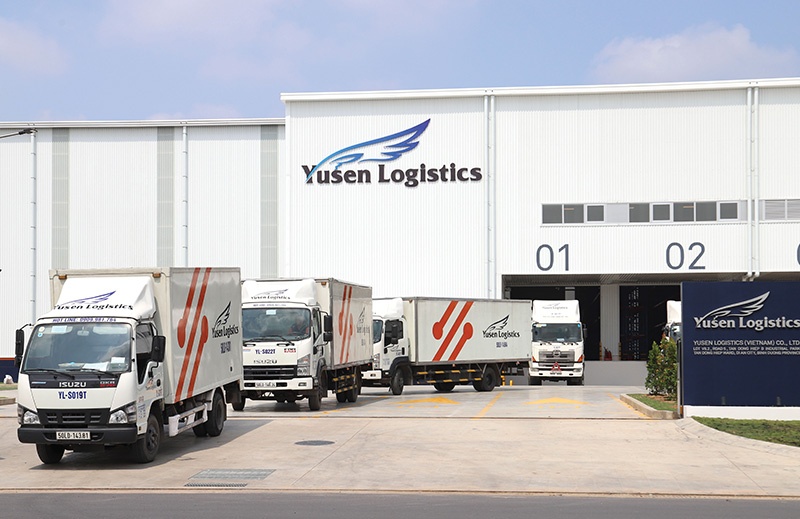Ample growth welcomed in logistics
 |
| Liberalisation of the sector can help logistics companies develop at a greater pace, photo Le Toan |
Filippo Bortoletti, senior manager of International Business Advisory at pan-Asia consultancy firm Dezan Shira & Associates, said that Vietnam’s logistics sector remains appealing to investors from other countries – notwithstanding the statutory market barriers – as local enterprises are mostly small- and micro-sized with traditional warehouses, weak infrastructure, and lacking both technology and capital.
“Customers can really experience a wide difference of quality and professionalism between different logistics companies,” Bortoletti said. “Such dynamics favour further concentration in the market, where revenues are mostly generated by foreign-invested enteprises due to consistent competitive advantages compared to local players. With numerous companies going out of business, and the increasing relevance of Vietnam in the global supply chain, the logistics sector here is going to continue growing at a fast pace, with good opportunities for foreign players.”
According to the Ministry of Industry and Trade, more than 4,000 logistics companies are operating in the country. Vietnam Logistics Association statistics said that, in the first nine months of 2021, more than 2,500 logistics companies had to temporarily suspend operations due to lockdowns and restrictions and over 570 companies shut down.
Apart from such considerations, customer habits are also changing and speeding up e-commerce adoption. The sharp increase in the number of e-commerce businesses is expected to continue in the coming years, increasing the demand for warehousing and delivery services, according to Bortoletti.
Meanwhile, BW Industrial Development JSC has completed the purchase of approximately 74,000 square metres of prime land in Bac Tien Phong Industrial Zone, developed by DEEP C Industrial Zones, in the northern province of Quang Ninh. The project is expected to be completed in the second quarter of 2023.
Lance Li, CEO of BW said, “Vietnam has emerged as the biggest beneficiary of pandemic-induced supply chain relocations, and we see ample room for growth in industrial real estate and will continue to invest heavily in international-grade factories and warehouses across the country.”
Likewise, Singaporean logistics firm YCH Group and Vietnamese conglomerate T&T Group held a ground-breaking ceremony for Vietnam SuperPort-Vinh Phuc ICD Logistics Centre in December 2021. The Vietnam SuperPort is the largest logistics infrastructure project spearheaded by a Singaporean company in Vietnam, with a planned area of more than 83 hectares and an investment of around $200 million.
“This project uses cutting-edge technologies which will help future-proof the logistics industry and enables the delivery of a more integrated, faster, and safer supply chain in the region. We hope to drive more initiatives like the SuperPort project to foster sustainable and inclusive growth for the region’s enterprises and communities,” said Robert Yap, executive chairman of YCH Group.
Since its entry in 2009, YCH has built extensive networks, asset footprints, and partnerships within Vietnam and is well-positioned to meet the current and future supply chain requirements of the market. The company has plans to increase and enhance its existing investment in Vietnam, for additional warehousing capacity and on another major logistics infrastructure project.
Bortoletti from Dezan Shira & Associates added that foreign players in logistics still enjoy a strong competitive advantage in terms of best practices and protocols, service quality, human capital, and technology. “Notwithstanding the high entry barriers, foreign players willing to tap into the local logistics are likely to quickly penetrate the market and get a positive return on investment,” Bortoletti said.
The Organisation for Economic Co-operation and Development (OECD) in a recent report advises the liberalisation of the sector as the entry barriers to foreign investment have been identified by the organisation as the main cause for the lack of development of local companies operating in the logistics, leading to higher logistics costs. It has called for Vietnam to progressively relax foreign ownership limits towards allowing up to 100 per cent foreign shares in the medium to long term as one measure.
Bortoletti pointed out that the main opportunities for foreign players when tapping into Vietnam’s logistics market come from the very structure of the sector. With most players being small and having to take on high logistics costs, foreign players can penetrate the market quickly by leveraging superior technologies and consolidating best practices. That said, some barriers remain.
“The hurdles to market entry are high – in general, foreign investors cannot hold more than 51 per cent of shares in a local logistics enterprise, and there are also requirements for the infrastructure to be used such as warehouses and vehicles,” he said. “Apart from statutory market barriers, foreign investors’ main challenge would be to find qualified professionals in the field and therefore should rely on their expertise by relocating existing experts or attracting talents on the ground. Of course, with a medium-term horizon, overseas players should still consider relocating experts from other countries to train local human resources, aiming to increase the service quality and reliability.”
What the stars mean:
★ Poor ★ ★ Promising ★★★ Good ★★★★ Very good ★★★★★ Exceptional
Related Contents
Latest News
More News
- Kurz Vietnam expands Gia Lai factory (February 27, 2026 | 16:37)
- SK Innovation-led consortium wins $2.3 billion LNG project in Nghe An (February 25, 2026 | 07:56)
- THACO opens $70 million manufacturing complex in Danang (February 25, 2026 | 07:54)
- Phu Quoc International Airport expansion approved to meet rising demand (February 24, 2026 | 10:00)
- Bac Giang International Logistics Centre faces land clearance barrier (February 24, 2026 | 08:00)
- Bright prospects abound in European investment (February 19, 2026 | 20:27)
- Internal strengths attest to commitment to progress (February 19, 2026 | 20:13)
- Vietnam, New Zealand seek level-up in ties (February 19, 2026 | 18:06)
- Untapped potential in relations with Indonesia (February 19, 2026 | 17:56)
- German strengths match Vietnamese aspirations (February 19, 2026 | 17:40)

 Tag:
Tag:



















 Mobile Version
Mobile Version